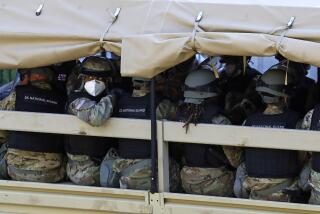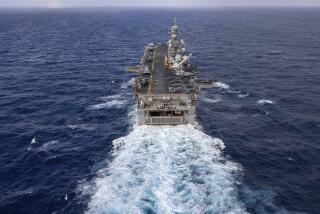Military May Shift to U.S. Patrols
- Share via
WASHINGTON — In the latest sign of concern about the terrorist threat to America, the Pentagon is considering naming a top military officer to oversee all military forces assigned to homeland protection.
By law and tradition, federal authorities have sought to minimize the involvement of the military services in dealing with such threats. Yet concerns about terrorist attacks were growing even before Sept. 11, and now many senior defense officials have concluded that the idea of a single military authority “makes a lot of sense,” said one senior official, who asked to remain unidentified.
While no final decision has been made, the Pentagon is considering giving this four-star officer the kind of operating and oversight authority that military commanders in chief now have overseas. The move could mean that some U.S. forces would have homeland defense, rather than overseas war-fighting, as their primary mission.
Until now, such tasks have been almost entirely the responsibility of state and local law enforcement, firefighting, health and emergency preparedness authorities.
The decision is under consideration at a time when the White House has reorganized federal homeland defense power in an Office of Homeland Security, headed by former Pennsylvania Gov. Thomas J. Ridge.
News of the impending decision was disclosed Tuesday night by the Washington Post.
Pentagon officials are considering placing this new commander atop one of several military organizations.
Two possible candidates are the North American Aerospace Defense Command (NORAD), in Colorado, and the Joint Forces Command, which is based in Virginia. But Secretary of Defense Donald H. Rumsfeld may also choose a different organizational arrangement, the defense official said.
In 1998, a blue-ribbon defense advisory panel recommended that the Pentagon focus homeland defense efforts under a single commander. The group suggested that the National Guard, which has been seeking a broader mission, might be given responsibility for the task.
But the idea of a “homeland CINC,” or commander in chief, quickly drew fire from both civil libertarians and conservatives, some of whom believed it would lead to unconstitutional violations of personal freedom.
One senior defense official privately conceded at the time that he was reluctant to announce such a move for fear of the storm of reaction that would come from conservative groups and others who feared that federal authorities might step on personal freedoms.
Former Defense Secretary William S. Cohen decided that instead of naming such a commander, he would set up a standing task force to coordinate the Pentagon’s response to a terrorist attack on the United States. This group is now part of the Joint Forces Command organization.
But on entering office last January, Rumsfeld began rethinking the homeland defense issue. He sought to initiate changes through the major defense study called the Quadrennial Defense Review.
The move, if approved, would be only one of several important changes in military organization set off by rising concern about terrorism.
Before Sept. 11, the U.S. military had only seven air defense alert sites where fighter jets were prepared to “scramble” in 10 to 15 minutes in response to an airborne threat.
Since the Sept. 11 hijacking attacks, the military authorities under NORAD have placed many more sites in operation to handle such alerts and have begun surveillance not only on flights coming toward U.S. shores but also on flights that originate within the continent.
More to Read
Sign up for Essential California
The most important California stories and recommendations in your inbox every morning.
You may occasionally receive promotional content from the Los Angeles Times.














